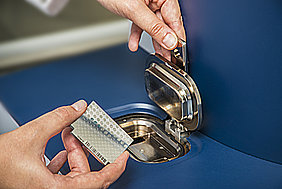The identification of bacteria using MALDI-TOF-MS is a cutting-edge and highly innovative method, which has already revolutionised bacteria identification in medical diagnostics. This technique also looks promising for the drinking water sector. The speed of the methodology can be critical when health officials need to make a decision on potentially issuing a boil water notice.
In the past few years an innovative method has been developed to quickly identify microorganisms – MALDI-TOF-MS. The method is now established in the clinical field and has considerable potential for the drinking water sector. The great benefit is the speed of the method. If bacterial isolates are present, it only takes a short time (hours) to identify multiple isolates. In the event that indicator bacteria are detected, the rapid species identification can supply important information on the contamination source on the same day as the findings. Consequently, boil water notices and a negative external image can be avoided and consumer faith in drinking water quality can be increased. Robust implementation of this methodology will therefore generate significant added value for the drinking water industry.
The investigations carried out in this DVGW research project have shown that MALDI-TOF-MS technology is also very promising for the identification of bacteria in the drinking water sector. Coliform bacteria, enterococci, Pseudomonas aeruginosa and thermophilic Campylobacter spp. from water samples can be identified very quickly using MALDI-TOF-MS. An accompanying cluster analysis also allows comparative analysis of isolates and can be very useful for root cause analysis of microbiological problems in drinking water.
In the medium term, identification by MALDI-TOF-MS also enables labor and time savings in the cultural detection of certain microorganisms, such as Pseudomonas aeruginosa and thermophilic Campylobacter spp. and can thus lead to more rapid confirmation of the findings.
As with all identification methods, the identification result of MALDI-TOF-MS is also dependent on the underlying database. In the course of the investigations carried out, it was shown for the coliform bacterial genera Enterobacter and Lelliottia that more reliable identification results can be achieved by a targeted quality-assured supplementation of the database.
Publications
Hügler, M.; Leister, C.; Hambsch, B.: Einsatz der MALDI-TOF-Massenspektroskopie zur Bakterien-Identifizierung in der Trinkwasser-Mikrobiologie. DVGW energie/wasser-praxis 73(12):52-59 (2022)
Hügler, M.; Leister, C.: MALDI-TOF-Massenspektrometrie in der Trinkwasser-Mikrobiologie. Veröffentlichungen aus dem Technologiezentrum Wasser Karlsruhe (2022)
Hügler, M.: Einsatz des MALDI-TOF zur Identifizierung von Krankheitserregern und Indikatorbakterien. In: Veröffentlichungen aus dem Technologiezentrum Wasser Karlsruhe. 27. TZW Kolloquium. Anpassungsstrategien und Handlungsoptionen für die Wasserbranche. S. 31-45 (2022)
Leister, C.; Hügler, M.: Draft Genome Sequences of Buttiauxella spp. Isolates from Water and Gastropods with Putative β-d-Glucuronidase Activity. Microbiology Resource Announcements 11, 3: e0006422 (2022) DOI: 10.1128/mra.00064-22
Hügler, M.; Leister, C.: MALDI-TOF-Massenspektrometrie zur Spezies-Identifizierung in der Trinkwasser-Mikrobiologie – MALDI-ID. Abschlussbericht W 201823 (2022)
Hügler M.: Schnelle Identifizierung von Bakterien mit der MALDI-TOF-Massenspektrometrie. In: Zukunftsthemen der Wasserversorgung, 25. TZW-Kolloquium, Veröffentlichungen aus dem Technologiezentrum Wasser, ISSN 1434-5765, TZW-Band 95: 117–141 (2020)
Hügler, M.; Reitter, C.; Hambsch, B.: Falschpositive E. coli-Nachweise in Trinkwasserproben. DVGW energie | wasser-praxis (EWP), 1/2019: 44–46 (2019)
Hügler M., Reitter C., Hambsch B., Tiehm A.: Schnelle Identifizierung von Bakterien. Wasserforum, Sonderpublikation zum 13. Langenauer Wasserforum, 11/2019: 38–40 (2019)
Hügler M., Stange C., Ho J., Tiehm A.: Molekularbiologische Methoden – Trends und Entwicklungen. In: Entwicklungstrends für die Wasserversorgung, 22. TZW-Kolloquium, Veröffentlichungen aus dem Technologiezentrum Wasser, ISSN 1434-5765, TZW-Band 80: 45-63 (2017)
The volumes of the TZW publications can be ordered here.

![[Translate to English:] Prüfstelle-Produktprüfung_Teststand Test centre and product testing](/fileadmin/_processed_/0/9/csm_TZW-Karlsruhe_Pruefung_Geraete-Teststand_377188946c.jpg)
























